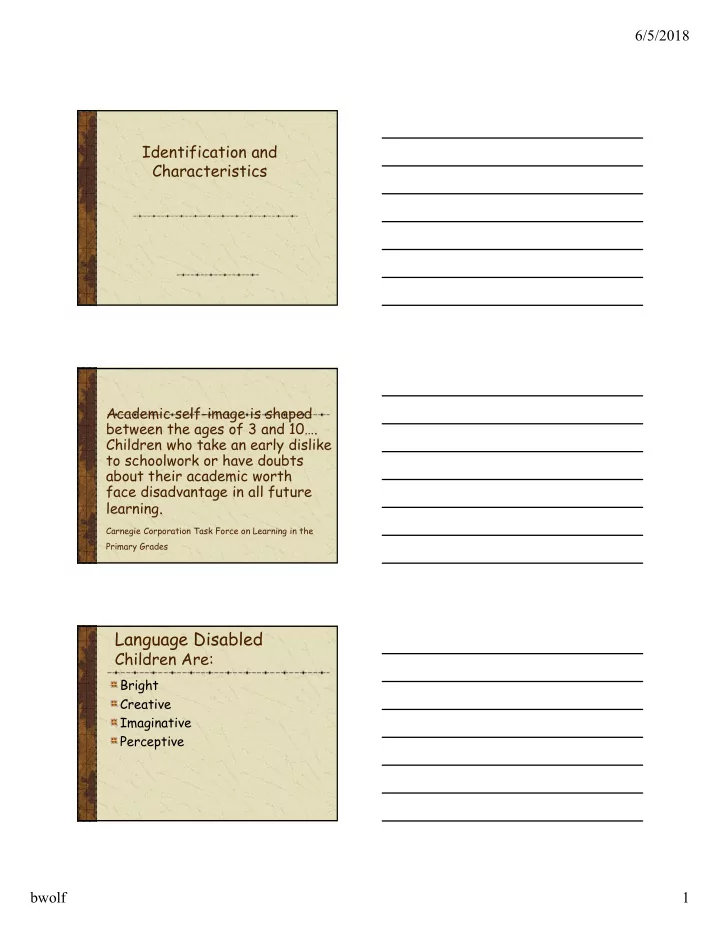

6/5/2018 Identification and Characteristics Academic self-image is shaped between the ages of 3 and 10…. Children who take an early dislike to schoolwork or have doubts about their academic worth face disadvantage in all future learning . Carnegie Corporation Task Force on Learning in the Primary Grades Language Disabled Children Are: Bright Creative Imaginative Perceptive bwolf 1
6/5/2018 Their learning difficulties may affect: Oral language expression Reading Handwriting Spelling Written expressive language Organization Problems may occur in any combination and in any degree of difficulty. bwolf 2
6/5/2018 Dyslexia is a specific learning disability that is neurological in origin. It is characterized by difficulties with: accurate and / or fluent word recognition and by poor spelling and decoding abilities. These difficulties typically result from a deficit in the phonological component of language that is often unexpected in relation to other cognitive abilities and the provision of effective classroom instruction. Secondary consequences may include problems in reading comprehension and reduced reading experience that can impede growth of vocabulary and background knowledge. Adopted by the IDA Board, November 2002 and by the National Institutes of Health, 2002. Language disabled students may have trouble with expressive or receptive language bwolf 3
6/5/2018 Receptive language is input …how the child receives and responds to oral language Listens Understands vocabulary, word meanings bwolf 4
6/5/2018 May have a short auditory span for spoken words, syllables or digits. May be able to recognize the word but be unable to retrieve it. • Follows directions Phonological awareness What did children hear when they wrote what was dictated? ROW MUSNT BILL TINTED “A” TURNIP OUTS FIR PLY HUM TEDIUM TEA SET HONOR WALL AL WAITS BEEP A LIGHT DIAMOND DIED WEIGHTS FOR NOME ANN bwolf 5
6/5/2018 …how the child receives and reads visual clues Body language Surroundings Pictures on a page Symbolic language For reading For Math facts They may: Fail to discriminate or recall letters or words. Miss detail Have figure/ground confusion bwolf 6
6/5/2018 Reading involves: Understanding of orthography (the look of letters) Phonologic Awareness Ability to integrate material read Understanding of language for: Phrasing Comprehension - Clue words tell who, what, where, how Expressive language is output. Oral language: May be delayed Lack organization Be hard to trigger, they can’t get started Semantics - word finding Syntax – grammar, immature or unembellished sentence structure bwolf 7
6/5/2018 Expressive language may be how the child expresses himself orally. Vocabulary Sentence structure Organization …or how the child expresses himself in writing bwolf 8
6/5/2018 Handwriting: Letter formation Automaticity Spelling Composition Length Clarity Complexity bwolf 9
6/5/2018 It may be related to ADD, ADHD, Anxiety, or Depression The most consistent aspect of children’s learning problems is its inconsistency bwolf 10
6/5/2018 bwolf 11
Recommend
More recommend